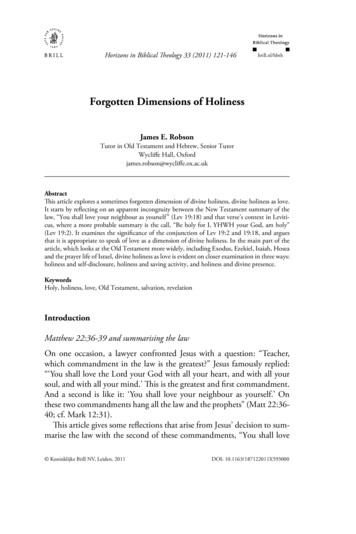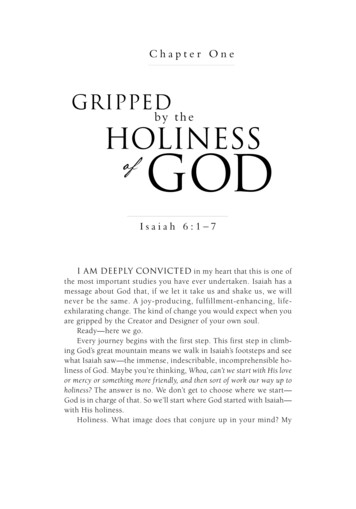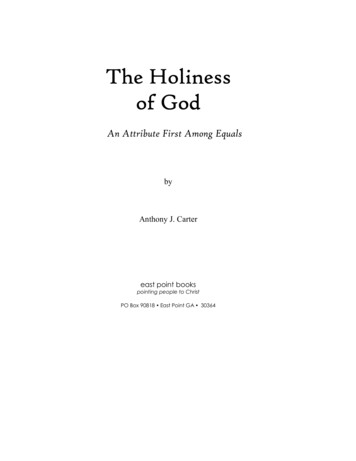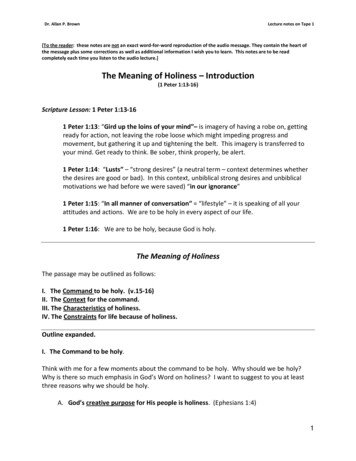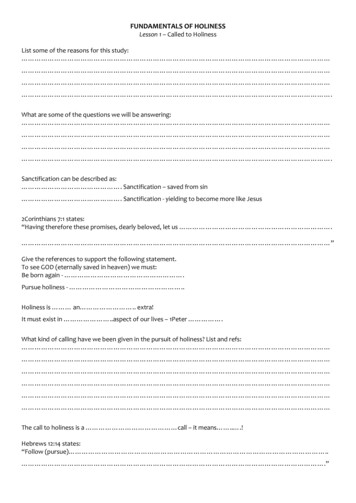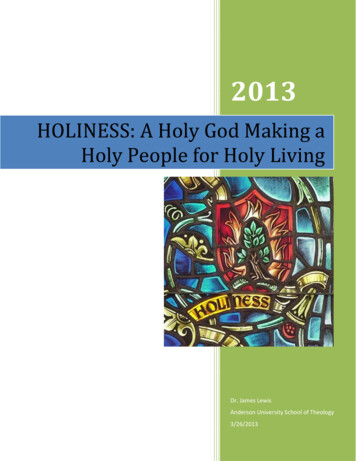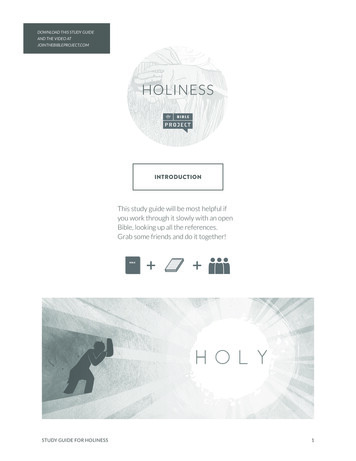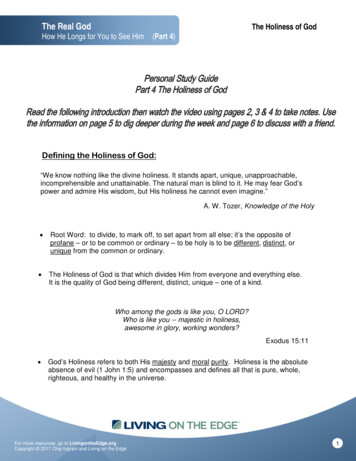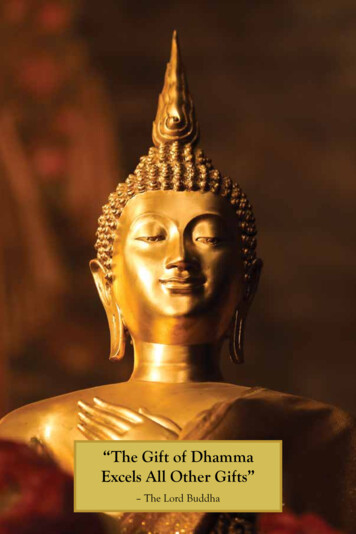
Transcription
“The Gift of DhammaExcels All Other Gifts”– The Lord Buddha
His Holiness Somdet Phra Yannasangvorn,The late Supreme Patriarch of the Thai Saṅgha“I provide knowledge to anyone who is interested in practicingDhamma and at the same time, I am repaying the kindness ofmy preceptor by serving His Holiness Somdet Phra Yannasangvorn.”
Ācariya Mahā Boowa Ñāṇasampanno“Por Mae Kru Jarn, means Father, Mother, and Teacher.The novices and monks staying with Luangta Mahā Boowawere treated as if they were his sons while Luangta himselfwas regarded as both father and mother to them.”
Dhamma should not be sold like goods in the marketplace. Permission to reproduce this publication in anyway for free distribution, as a gift of Dhamma, is herebygranted and no further permission need be obtained.Reproduction in any way for commercial gain is strictlyprohibited.First printing::ISBN:Printed by:November, 20146,100 copies978-616-7174-83-9Silpa Siam Packaging Printing Co., Ltd.61 Soi Phetkasem 69,Leabklong Phasricharoen Rd., (North),Nongkham, Bangkok, Thailand 10160Tel. 66 2444-3351-9 Fax. 66 2444-0078E-mail: silpasiamprinting@hotmail.com
CONTENTSChapter One-- Growing UpEarly lifeSchoolThe Question of Converting to ChristianityDiscovering the DhammaChapter Two-- The Worldly LifeEarning Money for Studying AbroadAn Overseas StudentThe Fruits of MeritMy Feelings after GraduationThe Life of an Ice Cream Shop ManagerChapter Three-- Approaching the DhammaMy First Approach to Studying DhammaThe Fascination with DhammaThe Movie TrailerResigning from My JobMy Resolution after ResigningChapter Four-- The Lay MeditatorMy Self-Meditating LifeFighting against My DesiresBecoming Confident in My Dhamma PracticeChapter Five-- Becoming a MonkSearching for a Temple for OrdinationRequesting Permission for 358
Chapter Six-- A Monk’s Life61Starting My New Life as a Monk63The First Test as a Newly Ordained Monk65Changing My Perspective69Monastic Life at Wat Pa Baan Taad73Enhancing My Dhamma Practiceby Reading Luangta’s Books79Listening to Dhamma Talks by Luangta85The Western Monks Listening to Dhamma of Luangta 90A Good Meditation Teacher92Eating to Live93Fasting to Defeat the Defilements95Luangta Giving Advice without Me Asking102Beating the Fear103Physical Work vs. Spiritual Work104Putting the Right Person on the Job107Appropriate Time for Meditation109Fear of the “Tiger”110Reprimanding Students with Loving-Kindness113Using Anger to Trick Students116The Strictness of Luangta118Refraining from Sleep122Frugality of Luangta123Behaviors of an Arahant124Healthcare of Luangta124Dhamma Therapy125Luangta’s Personal Attendants127Memory and the Truth128Knowledge Excluded from Tipiṭaka129Isaan Funeral Ceremony131Fighting without Retreating133No Other Interest except in the Dhamma135
Chapter Seven-- Moving to Wat YannasangvararamGoodbye to Wat Pa Baan TaadStaying at Wat YanHistory of Wat YanBuildings in Wat YanHistory of Meditation Residence at Chi-On MountainSomdet Did Not Recognize MeRepaying the Kindness of My PreceptorMeditation Center on Chi-On MountainRoutines and Responsibilities of Monks at Wat YanMeditation Center for LaymenObservation of MyselfBitten by a Snake at Wat YanLuangta’s Visits to Wat YanFuneral Rites for Our TeachersThe Substitute Teacher for LuangtaConclusionDhamma on the MountainAddendumDaily Life Schedule of Phra Ajahn Suchart 154155157158159160163181183
Chapter OneGrowing Up
2 My Way
Growing UpEarly LifeMy father came from Suphanburi and met mymother in Bangkok. He didn’t go to school becausemy grandfather passed away when dad was still young,and my grandmother could no longer afford to send himto school. Because of this lack of education, my dadhad done all he could do just to earn a living. Whereverthere was a job offered, he moved to work there. Becausemy parents had jobs that required them to move aroundfrequently, it was extremely difficult for them to take careof me, so when I turned two years old, my dad took meto stay with my grandmother, who lived in Suphanburi,so that she could look after me.Living with my grandmother was an enjoyable timein my young life. In fact, since I only saw my parentswhen they visited once or twice a year, I really didn’t missthem. In fact, I hardly knew them. As we know, childrenjust take life as it comes to them, and my life withgrandmother was where I felt the most comfortable— 3
4 My Wayit was my home. Reflecting on the influence that peoplehave had on my life, I realize that my grandmotherwas an important figure as I grew up. She was a strictvegetarian, and I grew up eating a mostly vegetarian diet.When I craved noodles with meat, she suggested thatI eat plain rice porridge with peanuts instead.Grandmother sold vegetarian dumplings to beoffered to ancestors or Chinese gods, and I oftenaccompanied her, wearing white clothes and watchingtraditional Chinese plays at vegetarian festivals.Spending so much time with an elderly person hada great deal to do with shaping my personality.My tendency to seek solitude is undoubtedly partiallyinfluenced by my grandmother. My temperamentis best described as kind, friendly, and reserved—all most likely formed during my early years with mygrandmother.I feel I was a relatively normal kid, usually spendingtime hanging out with my friends, playing sports andthe games country market kids usually play. Yet therewas a limit to what I did, based on moral and ethicalconsiderations—that is, I never broke the precepts.Because I disliked killing animals, I always refused to gofishing. I also refused to steal others’ property; it feltuncomfortable to do so. I learned early on that lying toothers just leads to discomfort due to the fact that deepin your mind you are aware of your own deeds.
Growing UpDuring the time that I lived with my grandmother,I would sell pork buns, dumplings, or Pa Thong Go(Thai-style Chinese crullers), and lists of lottery winnersto earn the money to buy toys and snacks for myself.Again, I just took this in stride, seeing opportunities tomake a little extra spending money and actually enjoyingthinking up ways to come up with the money.I only have one sibling: a younger sister born nineyears after I was. Because of this age difference, shedid not live with me while I was with my grandmother,and by the time she was born, I was already off to schoolin Bangkok. And later, when I went to the U.S. to study,she went to Chulalongkorn University in Bangkok.These circumstances help explain why we neverdeveloped a close sibling relationship. Her knowledgeand understanding of the Dhamma are limited becauseit isn’t something that is genetically transmitted byparents, but from Kamma that each person hasaccumulated. We were both born from the same motherand by convention are called brother and sister, butspiritually we are not true siblings. 5
6 My WaySchoolWhen I reached the age to enter school, I startedFirst Grade at a local public school in Suphanburi, butafter only one year, my grandmother, following herChinese cultural background, moved me to a Chineseprimary school. The only drawback I encountered therewas that they placed me in the First Grade again.I completed Third Grade at the age of nine or ten,and after school was over that year, since my parents hadgotten steady construction jobs in Pattaya, I went thereto live with them. While life with my grandmother wasgood, it was also great to be living with my parents againas a family.Not long after moving to Pattaya, my father got toknow a teacher from the Seventh Day Adventist School(a Christian school offering English courses), and shesuggested sending me to study at their school in Bangkok.Dad and mom discussed this opportunity and decidedto send me to Bangkok when the new school year began.Despite the fact that I was supposed to go into the FourthGrade according to my age, because my previous schooltaught in Chinese, I was again subject to starting overagain—in the First Grade. Compared to kids my own age,I was way behind them because I had to study in theFirst Grade for three years.My progress in school changed, however, aftermy first year. After one year, I was eligible to skip toThird Grade, and then after that year, to skip Fourth and
Growing UpFifth Grades and go on to Sixth Grade. This helped meclose the gap in age with my classmates.During the time that I was a student in Bangkok,my parents ran a restaurant in Pattaya, and I would comeback home on weekends and summer breaks, workingas a waiter and assisting customers and even sometimesguiding tourists. Looking back, I see that this was a goodopportunity to learn about the realities of working life.While the school in Bangkok was a Christian school,I found that their religious beliefs and teachings onabstaining from unwholesome deeds were similar to thefive precepts in Buddhism, such as not killing animals,not stealing property, and not lying. And the schoolprovided only vegan food, a diet followed by manyBuddhists. But even though there were many similarities,there were some fundamental differences, especiallythe potential for meditation to end all forms of sufferingthat is the centerpiece of Buddhism.Just when I was beginning to feel as if I was on trackwith my education, a school inspection by the ThaiMinistry of Education revealed that the school failed tomeet legal requirements, and it was closed for aboutthree months. When the school reopened, one of thechanges I remember was not in the curriculum but in thedress code. Previously, students had been allowed towear whatever outfits they wanted, like many foreignschools, but the new dress code required a white shirtwith the student’s name on it and trousers just like thevocational students. 7
8 My WayThe Question of Convertingto ChristianityDuring my time at the Seventh Day Adventist School,the school gave an incentive to students to pay onlyhalf of the tuition if they converted to Christianity. I wasalmost convinced initially to take this opportunity to helpmy family by cutting my expenses. And since I wasn’t intoBuddhism (my folks had never taught me about religionor even gone to a temple), I gave a great deal of thoughtto converting.I didn’t immediately respond and when later askedwhether I would agree to convert to Christianity, I decidednot to. The financial advantage to my family couldn’toverride my inability to believe in God, as well as otherdoctrines of Christianity. After considerable thought andvacillation, I had to be true to myself. I had to say no.There was something about committing to a religion formonetary benefit that felt like too big a compromise—as if I was, in a way, lying.
Growing UpDiscovering the DhammaI discovered the Dhamma when I was very young—about twelve years of age. It was a life experience thatwas so powerful that it changed the way I saw life anddeath. One of my classmates at the Seventh Day AdventistSchool passed away, and the funeral ceremony had anopen casket so that we could pay respect to the deceased.What I saw spontaneously and distinctly imprinted onmy mind throughout the ceremony that I would bejust the same as him in the future—as would my familymembers and literally everyone.So I kept thinking about death long after I left theceremony. I had not fully accepted death yet and stillfeared it to some extent, but I had begun the process ofseeing it as a normal, natural occurrence, something thatall of us would eventually face. What struck me was thatI didn’t feel sad at all. I analyzed it logically, much likea scientist who, for example, analyzes the economic upsand downs with an unbiased mind.Consequently, this discovery led to overcomingattachment and craving. However, my attachment andcraving couldn’t be entirely eliminated because themind was not able to contemplate and stay focused ona continuous basis. 9
10 My Way
Chapter TwoThe Worldly Life
12 My Way
The Worldly LifeEarning Moneyfor Studying AbroadAfter graduating from high schoolin 1966, I didn’t go to college or universityin Thailand right away. Because the Seventh Day AdventistSchool I attended had not been accredited by the Ministryof Education, the students were not eligible to takeentrance examinations for any university in Thailand.The only option to further my education was to studyoverseas, and this applied to most of my school friends.As for me, knowing that my parents’ financial situationwould not enable them to send me abroad to study,I moved back home to find a job and begin the processof saving money.I got a job near U-Tapao airport working as a typist,and while that was my official job, I was also assignedadditional responsibilities such as translating forWesterners, driving, and purchasing. And even thoughI worked at a variety of tasks from 7:00 a.m. to 5:30 p.m.,Monday through Saturday, it wasn’t too taxing. So I wouldalso work on Sunday, being paid double time. Being ableto borrow my father’s Mazda pickup truck was helpfulin cutting down my commuting time. 13
14 My WayMy desire to go overseas and seek new experiencesgave me the motivation to keep up this seven-day workweek so that I could save sufficient funds for my studiesabroad. Something in my nature made me sympathizewith my parents and I knew how difficult it was to makeends meet, so right from the start I was committed totrying to earn the money for my studies without askingthem to sacrifice.After about a year, I had saved 30,000 baht, whichI naively figured would be enough for my studies abroad.Then I began the process of finding and applying toschools and buying a plane ticket.I never expected to be able to rely on my familyat all. I planned to rely on myself using my savings tocover the first portion of my stay in the States and thento study and work simultaneously. It didn’t matter ifI graduated or not, assuming that even if I failed to finishmy degree, what I learned and experienced would bebetter than not going abroad at all. My thinking was thateven if I were only able to stay for two years, I wouldn’tregret it. In fact, going overseas let me gain experiencefrom inside and outside the classroom—opening me upto experiences and ideas that I would never have beenexposed to in Thailand.Approaching my 20th birthday, I said goodbye tomy parents on the departure day in fall 1967 and toldthem that I didn’t mind if they didn’t send me money.But as parents tend to do, they saved what they couldand each month transferred money that helped coverabout half my expenses. By working during vacations
The Worldly Lifeand even sometimes during the academic semesters,I was able to make up the difference. While I didn’t livecomfortably, I managed to get by.An Overseas StudentOne advantage of having studied at a high schoolthat offered international programs was that my languageproficiency was advanced enough to enable me to avoidlong remedial language instruction when I enteredjunior college in the U.S. After two and a half years there,I transferred to California State University, where I spentanother two and a half years working towards a Bachelorof Science degree in Civil Engineering. The choice ofmajor was based on the fact that I was always moreinterested in mathematics than in the humanities.The usual four-year university study extended tofive years for two reasons. Working to pay for school andexpenses, I was not always able to focus fully on mystudies and had to retake some courses in which I hadnot performed well enough. Though this might appearto have been a waste of time, it didn’t really matterto me. I wasn’t in a hurry to graduate and knew thatsooner or later I would graduate—knowing that thingshappen according to conditions over which we havelittle, or even no, control.Life as a student in the U.S. was demanding.Between working to support myself and studying,there wasn’t much time for anything else. I lived the life 15
16 My Wayof a poor student, even having to skip meals when mymoney ran out. There were days when I only had enoughmoney for one meal, and I reluctantly took a job washingdishes because both hunger and cold weather made itextremely difficult to focus on my studies.After graduation, I decided to return to Thailandby traveling through Europe. Taking a flight to Belgium,I boarded a train and visited the Netherlands, Denmark,Sweden, Norway, Germany, Austria, Switzerland, France,and Italy. I had wanted to visit the U. K., but I would havehad to get a separate visa just to enter.With my belongings in a backpack, I slept in YMCAs,student dorms that cost US 1.00 a night, and even on thenight train trips between countries. Likewise, I rarelyspent more than US 1.00 on food and even visitedsome places that offered free food and drink—likea brewery that offered free beer. Throughout the trip,I spent roughly US 5.00 per day.The Fruits of MeritOne event that happened on a trip to the U. S. gaveme some insight into merit.I was on a plane from Osaka to Tokyo and foundmyself sitting next to a flight attendant during a break inher work. Because of some rough weather, she remainedin the seat for quite a while, and we had a nice chat. I toldher that I was going directly to the U. S. for my studies
The Worldly Lifeand wouldn’t have a chance to visit Tokyo. She said thatit was unfortunate that I wouldn’t get to see this amazingcity and if I were to be staying, she would be glad togive me a tour. Even though she knew I was just passingthrough, she gave me her address anyway.Due to bad weather, I missed my connecting flightfrom Tokyo to Hawaii and because the standard roomstypically reserved for passengers were all occupied, I wasput up in the Okura, a luxurious, five-star hotel. It wasalready 10:00 p.m. when I reached the hotel, but I decidedto see if I could get in touch with the nice person whohad generously offered to show me her city. I asked thereceptionist how I might contact her and she offered tohelp me send a telegram with my hotel and room numberin the message. Amazingly, at 8:00 a.m. the next morning,there she was, ready to show me the city. We spentthe whole day seeing the sights, with her pointing outplaces of interest and explaining their significance.I had, by chance, been put up in a free, first classhotel, had my food paid for, and equally by chancehad met a nice person who took a day out of her busylife to show a stranger around Tokyo. What could havebeen a negative, uncomfortable travel delay became amemorable, pleasant experience. It seemed to me thatperhaps this was the fruit of merit that I had made inthe past. 17
18 My WayMy Feelings after GraduationAfter my studies were over in the U. S., I had nomotivation to work for money. I was solely in search oftrue happiness; it seemed like there was fuel to lightthe fire of spiritual life. I had wondered what the key tohappiness actually was but never had a clue. All I knewwas that it definitely wasn’t gained by working, havinga family, or being wealthy.I’d always been fond of peace and solitude andwasn’t really into socializing with others even thoughI occasionally joined my friends when necessary. I lovedto go to the forest, the mountains and the beach andwas the happiest when I was surrounded by nature.So, after returning to Thailand, I was worn outfrom the grind of studying and working and wasn’treally very enthusiastic about finding a job. I questionedwhether life was about long hours hustling to makemoney. I had just spent several years working long hoursto save money to get to the U.S., then spent five yearsstudying and working, and now being faced with theprospect of finding another job that I would labor atfor 30 years until retirement made me seriously questionif there was nothing more to life than that.Luckily, I had saved enough money from my workin the States to enable me to live for another year withoutbeing forced to seek a job. I felt that I needed, and deserved,a well-earned rest. I enjoyed swimming, sun bathing,and reading books. Sometimes I got books from people
The Worldly LifeI knew; sometimes I exchanged them with tourists.Often, though, I just read books at a bookstore so thatI didn’t have to buy them. I read novels about thephilosophy of life, gaining insights into the choicespeople make in their lives. Some went along with thecrowd, working and getting married; others led spirituallives in the forest seeking the truth of life, but my questionsabout life went unanswered.Eventually, I realized that I had to find a job to supportmyself, but in looking for one, I decided that I would onlytake a job I liked. Just before I ran out of money, a friendcame to Pattaya to design an ice cream shop for a Westernowner, and when I found out that he didn’t have a manager,I offered my service and described my previous experiencein the ice cream shop in the States. After a meeting withthe owner, I was given the job and began work that I wascomfortable with.So, here I was, an engineering graduate working inan ice cream shop. I had made up my mind that I didn’thave the desire to do engineering work because dealingwith calculations would keep me thinking and preventme from having a peace of mind. Because a career wasnot what I was looking for, and being rich wasn’t apriority, I figured that I’d just do what was easy andrelaxed. I had made up my mind that a stressful, hecticjob was the antithesis of what I wanted in life. A jobthat enabled me to live simply—managing an ice creamshop—was just the ticket.At this point in my life I had come to the conclusionthat money, and the things that it buys—expensive car, 19
20 My Waygourmet food, a luxurious house—created a circularpressure to continue to earn more money to pay for themall. To me, a simple life with a cup or two of noodles andminimal expenses just seemed to be more reasonable.I found myself quite content to work at the shop a shortdistance from my house and live on 20 baht a day.The Life ofan Ice Cream Shop ManagerWorking for a Western entrepreneur, I found thejob quite easy. Since he wanted to serve ice cream likeit was served in the States (with flavored toppings—something quite uncommon in Thailand at that time),I just applied what I had learned in my job while I was astudent. I was in charge of setting up the operation,hiring and training staff, and ordering supplies for theshop. What was ironic about this job was that it paida higher salary than that of an engineer in Bangkok—where I would still have to rent a house and commute.In Pattaya, I could live at home, take a one-baht minibusto work, and make a higher salary doing relatively easywork.As things progressed, I found that I didn’t have towork all day long and just made sure that things wererunning smoothly. After that, I could read the newspaper,have some coffee, or even take a swim in the sea.And when the shop got busy, we’d all pitch in and helpeach other. Since weekends were high volume days,
The Worldly Lifethe weekdays were often relaxed, providing me with acomfortable lifestyle. During this period I was quitecontented with the way things were going along. 21
22 My Way
Chapter ThreeApproachingthe Dhamma
24 My Way
Approaching the DhammaMy First Approachto Studying DhammaMy first attempt at meditationwas a slow process of reading andwaiting for the motivation to commit to actuallymeditating.After working for two months, by chance I waschatting with a tourist in Pattaya. He found out that I wasinterested in Dhamma, so he gave me a Dhamma book,which was the first English Dhamma book I read.A small book of about 20 pages, it was originallyfrom Tipiṭaka (the Pāli Canon) and translated intoEnglish by a Western monk. The book focused on Anicca,known as impermanence, and the comparison betweenthe Buddha’s teachings and those of philosophersfrom the West. As I read through it, I found the bookenlightening.Apart from Anicca, the Lord Buddha also taughtabout Magga, referring to the Path for dealing withuncertainty. From the book, I realized the significance ofmeditation. It would calm your mind so that you would 25
26 My Waybe capable of accepting any changes or conditions. If youdidn’t have peace of mind, you would not be able toaccept the changes in your life. But if you were mindful,you would not be affected by uncertain situations.Then I wrote a letter to Sri Lanka requesting moreDhamma books, and they sent back the books of TheThree Basic Facts of Existence, DhammacakkappavattanaSutta (The Wheel of the Dhamma) , and Mahā SatipaṭṭhānaSutta (The Four Foundations of Mindfulness). I reliedmost heavily on Mahā Satipaṭṭhāna Sutta, taking it asmy teacher and my guide to practice meditation.In this Sutta, the monks are taught to start withsitting meditation and find a quiet place under a tree,in the forest or on a mountain. The book suggestssitting crossed-legged with eyes closed and consciouslywatching the breath throughout the practice. When themeditation is over, a monk must continue to be awareof four body postures: standing, walking, sitting, andlying down. Another meditation object is repulsivenesstowards 32 body parts. Also, he needs to contemplatecorpses in various states of decomposition. It is requiredthat a monk contemplate Vedanā, or feeling, when itarises in order to understand whether it is a pleasantfeeling, a painful feeling, or neither a painful-norpleasant feeling. Moreover, he should contemplatethe nature of arising and vanishing in the feelings.Then, contemplating Anicca (impermanence), Dukkha(suffering), and Anattā (not-self), he simply lets go,not clinging to anything.
Approaching the DhammaI had been reading the books for nearly threemonths without practicing sitting meditation untilone day I asked myself, “Why don’t I just startmeditating?” Once I was conscious that I was wastingmy time, I immediately started sitting meditation, andthat was the beginning of my virtue practice. If I didn’tstart doing it, I would end up not practicing and wouldbe distracted by other issues all the time. I would beprocrastinating or postponing the practice to next week,next month, or after getting other things done.At the very beginning of the practice, I felt restlessand distracted from breathing exercises, so I recited MahāSatipaṭṭhāna Sutta in English while sitting, which tookapproximately 40 minutes before meditating.Therefore, for new practitioners, if you are distracted,you can resort to chanting, instead of saying “BuddhoBuddho,” or visualizing breaths. Chanting is another formof meditation practice. To follow this approach, it’s notnecessary to have palms joined at the chest or to sitsideways. You can sit with legs crossed, like when doingsitting meditation, and keep chanting. The key is to bemindful when chanting. The longer you do the chanting,the longer you can sit and maintain the inner peace.Reciting the Buddha’s name, “Buddho, Buddho,” tendsto leave a gap between words, enabling strayed thoughtand disturbance of body aches; however, being attentiveto chanting produces less pain because the mind isconcentrating solely on chanting and disregardingfeelings created by the body. After the chanting sessionof about 30-40 minutes, you will feel lighter. 27
28 My WayWhen chanting Mahā Satipaṭṭhāna Sutta, you willunderstand the Lord Buddha’s teaching. The Lord Buddhataught us to be mindful by contemplating the body,feeling, mind and phenomena. The meditation of bodyawareness comes in several strategies. To exemplify,we should be mindful of the four postures. A personshould be mindful when walking, standing, sitting, orlying down. Alternatively, other meditation objectscould be the contemplation of the 32 body parts, orawareness of the present actions and activities of thebody, such as speaking, facing to the left and to the right.These techniques could help foster mindfulness. In thepresence of mindfulness, thoughts are under control,adhering to breaths or the words “Buddho, Buddho”so that the mind would not wander.Next, I concentrated on my breath where my mindwould attain happiness and tranquility. Though my minddidn’t go deep, it wasn’t restless. It only went deeperwhen experiencing bodily pain while sitting. At thatmoment, I automatically realized that I had to dependon a meditation object, so I chose to recite the words“Anicca, Anicca”, which I did not have to do for long. Afterdoing so, the pain immediately disappeared, allowingthe mind to stay in peace. I was amazed by the potentialof the meditation object to change the state of mind.At first, the suffering in mind occurs when experiencingunbearable pain. You would like to get rid of the pain andwant it to vanish. At that particular moment, if there isnothing to control the mind, you will no longer want tobear the pain or continue sitting. Reciting the mantraonly for a short time will cause the pain to vanish and let
Approaching the Dhammathe mind become cool and calm. Just let the mind stay inthat meditative state until it withdraws from that statebefore you get up to do other things.Always be mindful when standing up. Even beforestanding up, you should be mindful that you are going tostand up and try to be present all the time. To demonstrate,you can practice contemplation of the body (Kāyagatāsati) through the four body postures. You will beconstantly mindful when you are going to do sittingmeditation, as well as when standing, walking, andlying down. When walking, you may feel like chantingwhich is another approach to help bring the mind backfrom wandering. The chanting could be applied throughfour postures: walking, standing, sitting, or lying down.For me, the Dhamma was easily understoodbecause I read Dhamma books in English, which did notcontain royal or hierarchical terms, but only simplewords. For instance, the word “eat” is being used whencommunicating with the Lord Buddha or a beggar, andall classes of people com
Enhancing My Dhamma Practice by Reading Luangta’s Books 79 Listening to Dhamma Talks by Luangta 85 The Western Monks Listening to Dhamma of Luangta 90 A Good Meditation Teacher 92 Eating to Live 93 Fasting to Defeat the Defilements 95 Luangta Giving Advice without Me Asking 102
